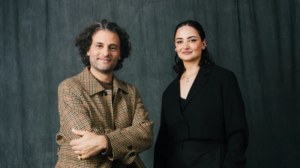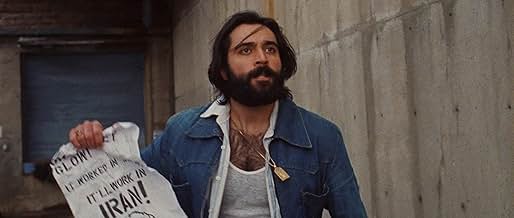It’s 1979, and everyone’s blood is boiling. In post-Vietnam America, Iranian immigrants face unjust prejudice and judgement based solely on their appearance and Jasmin Mozaffari’s Motherland begins with a defiant jolt. As the Iranian Hostage Crisis continues, citizens feel targeted, but one young man, Babak, is also ready to get married to one he loves. Will self-proclaimed patriots stand in his way of Babak achieving his own American dream?
Full disclosure: we conducted this interview a few days after the Presidential election, and re-watching Mozaffari’s film in that headspace felt different. There was a heaviness as we checked in on each other and expressed fears of how a second Trump administration would affect those considered most vulnerable.
“I’m Canadian, but I feel it,” Mozaffari admits. “Canadians are pretty depressed right now as well, but I did think about how the film would read now in this environment.”
“Great art does that,” Arian Moayed, the film’s producer, adds. “It does that in the times of heartbreak and the uncertainty unveils other things that you didn’t even realize were inside of there. The toxicity of men. And that’s why we go back over and over again to pieces of art when we’re in times of despair and rage.”
You can tell when a filmmaker is digging into their own past or memories to examine something personal. Mozaffari wanted to honor and tribute her father, but Motherland carries a higher purpose.
“I wanted to pay homage to my father, who is no longer with us,” Mozaffari says. “We weren’t super close or anything, so it was a bit tricky. It was, in a way, for me to understand him. After he passed away, I couldn’t understand him in life as much as I could, maybe, in the making of this film. The other part of it was for the sake of representing Iranians, and Middle Eastern people at large, in a way that felt humane and reclaimed our humanity, especially in diaspora stories and looking at this one event in the past to illuminate what’s happening now. From a film point of view, a lot of other people, other than Iranians, have told Iranian diaspora stories, and I wanted to be one of those people to course correct it. I wanted to reclaim the narratives that have been told about us in the new in order to show how these stories told today were started. This is where the narrative started to change about Middle Eastern people. This is one of the biggest event that has been forgotten thing over time.”
Motherland tells a personal story against the backdrop of political turmoil. Babak leaves town to meet his girlfriend, Katie’s, parents, and he is fearful of the divide between them. Before they pile into the car, though, Babak makes the decision to shave off his dark, scruffy beard. We see the preparation of this moment but not the act itself–something that Mozaffari does repeatedly in her film. The act is important, but so is the aftermath or the reaction from the characters.

“I always think of the politicization of Middle Eastern men’s hair in general, and facial hair, especially,” Mozaffari says. “It’s amazing how something like a beard can change an entire person’s way of life as a Middle Eastern man. To this day, I think about going to the airport with a beard or shaving it off feel like a decision that changes your entire day. I remember my father shaving it off after 9/11, and he didn’t grow it back. One thing Iranian men are going to do well is grow a beard. I came of age during that time, and I remember that he never grew it back. Going through the airport and going across the border was hell. It continues to this day, and I wanted to allude to it. This feeling that people might look at you like a terrorist.”
“My mom said that to me,” Moayed says. “I told her that I made a character on a beard, and she told me that I needed to shave it. What I love about the beard and Babak shaving it off and what’s s heartbreaking about that moment, as someone who has witnessed it and done it themselves, is that at the same time when you do something like that, you think it’s going to solve the issue. The reality is that the terror that people have felt because of the word “Iran” was enough–beard or not. On my passport, it says that I was born in Iran and I might have a long beard because of a job that I had, especially before Succession. I have friends of mine with beards that often say at airports they have to suggest that the security Googles them so they can prove that they are an actor and they just have facial hair for a job or a part.”
Babak and Katie meet up with her parents at an isolated bar. Werner, Katie’s father, is distant, and her mother is casually dismissive. We are accustomed to a tense or potentially explosive interaction to occur, but that’s not what Mozaffari does at first. Werner sports a light cowboy hat–an undeniable symbol of traditional Americana–and Mozaffari shrouds the scene in darkness. It’s a disarming scene, and we let our guard down almost as much as Babak does.
“That scene was so hard to do and to write. It’s a face off, but I am not interested in making a scene where it’s just a white guy who’s bad. I wanted it to feel like he was open to Babak at first, and they share a bit of a joke at the beginning. I wanted that to be disarming with this lost in translation mention of a wiener like a hot dog. I think Werner is warming up to him until Babak tells him that he’s not moving back to Iran and that he’s staying with his daughter. I wanted Werner to think that Katie was going through a phase, but then he realizes that it’s something more permanent–that’s not okay with him.
It’s also a conversation around the question of ‘who is a good immigrant?’ Werner thinks that he was a good immigrant because they are German and they settled the land here like, ‘We’re the good immigrants but you’re not the good kind.’ They have stuff in common and it’s remarkable that they recognize it in each other in such a short conversation.”
We leave Babak and Katie lastly as they drive down the highway. The wind whips around them as they sit in silence. Has too much changed between them? Has the volatility and anger in the world seeped into their relationship? It’s an elegantly opaque way to leave us.
“These two gorgeous, sexy people have fallen in love and they think they are going to take it all,” Moayed says. “That renegade feeling is so real for so many of us. What’s true–and historically true–is that the two of them not wanting to know what was going to happen was the entirety of the ’80s and ’90s for every Iranian. Literally. I remember when I was little boy and we had only been here for three or four years and my elders told me to tell everyone that I was Iraqi, because, at that time, Iraq hadn’t happened yet. That car ride is emblematic of what everyone went through. It’s never going to be rosy.”
“I think everything has changed for them at this point,” Mozaffari says. “I want the characters to be in a completely different place by the nd of where they started. The arc needs to feel earned. I think they are naïve as a couple–my parents certainly were. There’s questions about why they’re getting married, and I didn’t want to point it out so the audience could question it all too. Is it just for love? They certainly love each other, but is it also so he can stay in the country? At that time, it was hard for a woman to be divorced, and Katie has been married before. I have my own ideas where they end up, but I always think of it as the shot in The Graduate. Films from that time always left us with an ending that ambiguous and uneasy, and I wanted to pay tribute to that time of American cinema where people started to make films that didn’t leave you with a fuzzy feeling at the end.”









